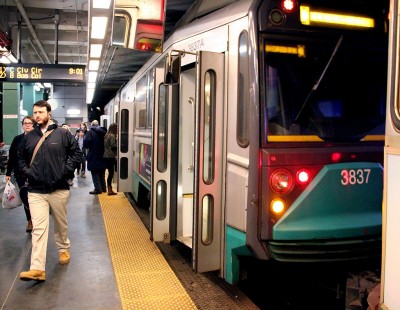Massachusetts Gov. Charlie Baker released a report Wednesday of the findings from a Massachusetts Bay Transportation Authority special panel announced on Feb. 20 for MBTA analysis. The findings detailed problems facing the MBTA, and outlined plans to improve and reform the system, according to a Wednesday release.

In order to properly identify problems, the panel met 18 times over six weeks, reviewed past studies, met with current and former MBTA staff, general managers and Massachusetts Department of Transportation secretaries and toured four MBTA maintenance and operations facilities, the report stated.
The panel reported that the MBTA would be bankrupt if not for the subsidies provided by the Commonwealth. The panel also found that the MBTA struggles to complete projects and has an ineffective workplace environment.
Additionally, the panel concluded that shifting roles of leadership have created instability and that the MBTA has not been held accountable to the governor or legislature for the amount of money the Commonwealth invests in it.
Baker said in the release that the Commonwealth needs a proper transportation system, and expressed excitement regarding the possible MBTA improvements.
“Massachusetts deserves a reliable, well-managed, cost effective transportation system, and this in-depth report offers a plan of action to responsibly pursue organizational and operational reforms to reach this goal,” he said. “Thanks to the hard work of the panel members, we have action items to improve service reliability, correct the failures that would bankrupt the MBTA if left unchecked and rescue the transportation system our economy relies upon.”
Josh Ostroff, the outreach director for Transportation for Massachusetts, voiced great support for the panel’s efforts to find the roots of the problems the MBTA has been facing.
“The panel did an important service in identifying the need for better management and oversight at the MBTA,” he said. “I very much appreciate the clear statement in this report that a well-run MBTA is critical for the well-being of the Commonwealth and the region.”
Despite supporting the government’s efforts in releasing the report, Ostroff said the report does not go far enough.
“I would take it a little further, as the panel did not talk about the importance of public transit to the environment and to public health and for the opportunity for people to get to work and to school and live their lives,” he said.
The report also detailed recommendations that the panel felt would help to improve the MBTA. Among these recommendations were creating a new oversight committee, increasing the self-generated revenue of the MBTA, creating strict budgets plans for one, five and 20 years, improving customer service, updating routes and planning to improve vehicles and infrastructure.
While Ostroff said many of these plans sound helpful, the issue of raising fares is of interest to everyone in Boston using the MBTA’s public transportation systems.
“The extent to which fares should be increased and the impact of increases need to be looked at very carefully. We would be very concerned if the MBTA intended to increase fares substantially because of the potential impact on people of lower income,” he said. “Right now, the modest, predictable increase in MBTA fares that the Legislature voted on in 2013, that was done for good reasons and the Legislature should not back off that very quickly.”
While Massachusetts is making progress toward improving the transportation system, Ostroff said it will likely take some time to see direct results.
“The T did not get run underground overnight, so it will not be fixed overnight. Within three months or so, we should see some clarity from the top levels of the MBTA. It could take several years for some of it to bear fruit in a noticeable way, but that is not bad,” he said. “The Legislature is going to have to vote on specific bills coming out of the legislation and I expect this to happen in the coming months.
Several residents said they were frustrated with the MBTA and voiced different opinions on the best methods of improving the system.
Noman Pathan, 26, of Brighton, said the main problem the MBTA faces is financing.
“From what I have heard, it has more to do with the finances than anything else,” he said. “Raising the fare is not going to help. I remember paying $1.25, and I remember when it used to be free going inbound towards Allston, but you have to pay for it now, and it is more now, but still it is not helping.”
Barbara Beck, 59, of Allston, said money will not be able to fix the problems facing the MBTA.
“They have got to do something about the T, and I don’t think throwing money at it is always the best way,” she said. “They keep raising fares and throwing more money at it, but structurally, something is wrong. They’ve got to manage the structure of it.”
Chandra Bani, 25, of Allston, said the old trains and misplaced funds are the primary cause of the MBTA’s problems.
“This winter was terrible. I heard something about letting people ride for free for a day, which seems like a pretty bad idea because they’re just going to lose a lot of money,” she said. “It’s not where the money needs to go right now, so hopefully they’ll get on it. It’s been bad for a while. The Green [Line] is so old.”




